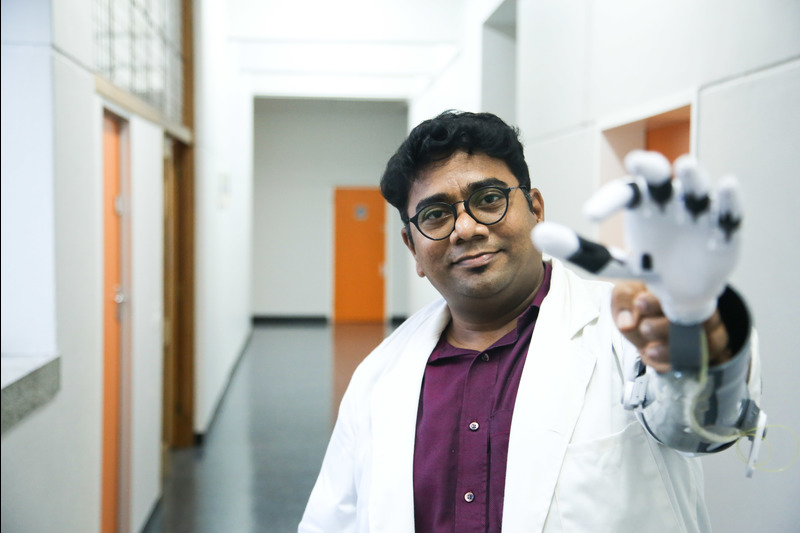A fellowship to bridge the industry–academia gap
27 September 2023 | Story Natalie Simon. Photo Supplied. Read time 5 min.
South Africa is battling the dual crises of high unemployment and a critical skills shortage. The manufacturing sector is a key contributor to economic growth and a direct employer. But growing the sector requires innovation and the ability to scale up and take that innovation to market through a guided industrialisation process. This is why the University of Cape Town (UCT) and the Manufacturing, Engineering and Related Services Sector Education and Training Authority (merSETA) have partnered to offer the Industrial Innovation Fellowship.
“In academia, we are very good at problem-solving, but our challenge is identifying the right problems to solve and then bringing that solution to where it is relevant,” said Professor Sudesh Sivarasu, director of the Biomedical Engineering Research Centre at UCT. He is one of the driving forces behind the fellowship.
“Industry, on the other hand, are very good at scaling and bringing their products to market. But not all companies have sophisticated research and development infrastructure and capacity.”
Here, argues Professor Sivarasu, a truly transdisciplinary approach is likely to have the most impact. This means working together not only across scientific disciplines, but also across sectors to find broad-reaching solutions.
“In academia, we are very good at problem-solving, but our challenge is identifying the right problems to solve”
“Our approach with this fellowship is to make it a two-way translation. Can we, in academia, be a problem-solving agent for industry? From there, the onus is on industry to take that solution to market so it doesn’t remain a project thesis gathering dust on a shelf.”
The Industrial Innovation Fellowship is a three-year project of at least two cohorts of fellowsI. It will offer various additional streams from the beginning of 2024, including medical devices, renewable energy components and automotive and rail components for localisation. The fellows will be embedded in their chosen industry, getting practical exposure to the workings of the sector while developing their industrial solution within the university’s infrastructure to solve a problem identified by industry.
“We are working with industry associations, including those representing medical devices, plastics extrusion, metal engineering and automotive components manufacture, to identify critical problems to solve,” said Dr Helen Brown, who leads applied research and innovation projects at merSETA. “Because the large manufacturing companies are part of these associations, we are hoping they will act as champions for the fellowship.”
Dr Brown adds that the response from private industry so far has been very positive.
Graduates with workplace-ready skills
Sivarasu notes that in our fast-changing world it is important for universities to future-proof their students.
“There is a global crisis of employability among graduates that universities need to urgently address,” he said. “At the same time, we, in South Africa, are experiencing a brain-drain in which large numbers of our most highly-skilled personnel are leaving for the seemingly greener pastures of wealthier countries. The onus is therefore on us, as universities, to plug this skills gap.”
UCT and MerSETA have already been collaborating to achieve this. The Industrial Innovation Fellowship is just the latest initiative to ensure graduates are equipped with the skills they need to be employed and be of value to their employers from the get-go.
“Each innovator that graduates from UCT has the potential to create their own start-up.”
The relationship between UCT and the MerSETA began with the national ventilator project in 2020, a response to the COVID-19 crisis. This and other projects laid the groundwork for MediVentors, a consortium between UCT, the University of the Witwatersrand, the University of KwaZulu-Natal and the Cape Peninsula University of Technology, with the National Technologies Implementation Platform as the industry partner.
The goal of Mediventors – foreshadowing the Industrial Innovation Fellowship – was to build a bridge from what academia offers to what industry could translate into new manufacturing opportunities, with an initial focus on medical devices. The initiative accepted students from undergraduate through to doctoral level. They were trained in the fundamental skills required for the development and manufacture of medical devices.
“What we are trying to do through this and other initiatives is not only make our graduates employable by industry but also equip them with the skills and know-how to create their own industry,” said Sivarasu. “Each innovator that graduates from UCT has the potential to create their own start-up or add to existing manufacturing operations, thereby feeding into our manufacturing ecosystem, which will in turn address our unemployment issues. It is our job to train and equip them accordingly.”
 This work is licensed under a Creative Commons Attribution-NoDerivatives 4.0 International License.
This work is licensed under a Creative Commons Attribution-NoDerivatives 4.0 International License.
Please view the republishing articles page for more information.










